
Blockchain technology is transforming industries, and real estate is no exception. One of the most revolutionary applications of this technology is blockchain-based digital land registry platforms. These systems are not just reshaping property ownership; they’re solving age-old problems like fraud, inefficiency, and inaccessibility that have plagued land management for decades.
This article explores how these platforms work, the technology behind them, their benefits, challenges, and global adoption. Dive in to uncover the future of land ownership.
Understanding Traditional Land Registries
Land registries are critical for recording property ownership, transfer histories, and legal titles. They provide legal security and enable property transactions by confirming who owns what. Despite their importance, traditional systems face numerous challenges:
- Manual Processes: Many registries rely on paper-based records, which are prone to errors and damage.
- Corruption: Manipulation of records often leads to disputes and loss of trust.
- Inefficiency: Lengthy processes delay transactions, frustrating buyers and sellers alike.
- Limited Access: Rural and underserved areas often lack access to registry services, sidelining vulnerable populations.
These issues hinder economic growth and limit trust in property markets.

Blockchain introduces a decentralized, tamper-proof ledger that records data securely and transparently. In a blockchain-based digital land registry, cryptographic algorithms link blocks to store property records. These platforms provide:
- Immutable Records: Data cannot be altered or deleted, eliminating fraud.
- Decentralized Control: No single authority can manipulate records, ensuring fairness.
- Transparency: All stakeholders have access to accurate, up-to-date information.
- Efficiency: Smart contracts automate processes, reducing delays.
By addressing the flaws of traditional systems, blockchain offers a robust, scalable solution.
Benefits of Blockchain-Based Digital Land Registry Platforms

Transparency and Trust
Every transaction on a blockchain is recorded on a public ledger. Buyers, sellers, and officials can verify property details in real-time. This openness fosters trust and reduces disputes.
Security and Fraud Prevention
Blockchain’s encryption ensures that records cannot be tampered with. Decentralization eliminates single points of failure, making data resistant to hacks and corruption.
Cost and Time Efficiency
Smart contracts automate tasks such as ownership verification and document validation, saving time and reducing administrative costs. Property transfers that used to take weeks can now be completed in days or even hours.
Inclusivity and Accessibility
Blockchain platforms provide underserved populations with digital access to land records, enabling them to establish ownership rights. This inclusivity is especially impactful in developing countries.
Digital Identity in Blockchain-Based Land Registries
Security and Verifiability
- Unique Identifiers: Each participant in land transactions (e.g., buyers, sellers) has a unique digital identity, ensuring secure and authorized access.
- Cryptographic Verification: Identities are validated cryptographically, preventing impersonation and tampering.
- Immutable Records: Blockchain transparently stores all transactions linked to digital identities.
Efficiency and Streamlining
- Automated Verification: Smart contracts verify identities, reducing manual checks and paperwork.
- Fraud Prevention: Secure digital identities minimize identity theft and fraudulent activities.
- Simplified Processes: Digital identities replace physical documentation and in-person verifications.
Privacy and Data Protection
- Controlled Sharing: Users can decide what data to share, enhancing privacy.
- Minimal Data Exposure: Only essential information is shared, reducing risks of breaches.
- Consent-Based Use: Individuals retain control over their data sharing and usage.
Real-World Success Stories
Several countries have already embraced blockchain land registries with remarkable success:
Sweden: Setting the Standard
Sweden’s Lantmäteriet was one of the first land registries to integrate blockchain. It demonstrated faster transactions and reduced costs while maintaining legal compliance.
India: Fighting Corruption
Andhra Pradesh has piloted blockchain to combat fraudulent property claims. The system provides tamper-proof records that improve trust and transparency.
Ghana: Empowering the Underserved
Ghana uses blockchain to formalize land ownership in rural areas. This helps small-scale farmers secure their property rights and reduces land disputes.
Challenges in Implementing Blockchain Land Registries
While blockchain offers significant advantages, it is not without challenges:
Technological Barriers
- High initial costs of implementing blockchain infrastructure.
- Need for skilled personnel to manage and maintain the systems.
Legal and Regulatory Issues
Integrating blockchain with existing legal frameworks can be complex. Governments must establish clear regulations for blockchain property transactions.
Data Privacy Concerns
While blockchain is secure, balancing transparency with privacy is challenging. Sensitive information must be protected while ensuring accountability.
Future Trends in Blockchain Land Registries
The future of blockchain land registries holds great promise in transforming land management. Key trends include:
- Enhanced Security and Transparency: Blockchain ensures immutable, transparent records, reducing fraud and disputes.
- Streamlined Processes: Smart contracts automate transactions, cut down on paperwork, and update records in real-time, reducing bureaucracy.
- Increased Accessibility: Remote access and secure transactions boost financial inclusion, particularly in rural areas, while reducing corruption.
- Tech Integration: IoT and AI enhance land monitoring and decision-making, with land tokenization enabling fractional ownership.
- Global Interoperability: Standardized protocols and international collaboration will enable seamless cross-border transactions.
While challenges like regulatory issues and cybersecurity remain, blockchain promises a transformative shift in land administration. Consult us to know more!
How to Build a Blockchain-Based Digital Land Registry
- Assess Needs: Understand the specific challenges of the existing land registry system.
- Choose the Blockchain: Decide between public, private, or hybrid blockchain networks.
- Develop Smart Contracts: Automate key processes like ownership verification and transfers.
- Integrate Geospatial Data: Use GIS to enhance property accuracy.
- Ensure Legal Compliance: Work with legal experts to align with regulations.
- Launch and Educate: Introduce the platform and provide training for stakeholders.
Conclusion: The Future of Land Ownership
Blockchain-based digital land registry platforms are more than a technological innovation—they’re a societal shift. By bringing transparency, security, and efficiency to property transactions, these platforms are setting new standards for fairness and accessibility. From Sweden to Ghana, the global adoption of blockchain in land registries is just beginning, and its potential is limitless.
Embracing this technology isn’t just about improving systems—it’s about empowering individuals, reducing inequality, and building a future where everyone can trust the foundations of ownership.
FAQs
How does blockchain work in agriculture?
Blockchain enhances agriculture by providing secure, tamper-proof records of crop data, farming practices, and supply chain transactions. It ensures transparency, automates trade via smart contracts, and enables product traceability. Farmers benefit from fair trade, reduced fraud, and decentralized financing.
What is the land management system using blockchain?
A blockchain-based land management system securely stores land records on a decentralized ledger. It ensures transparency, reduces fraud, simplifies ownership verification, and automates property transfers through smart contracts, minimizing disputes and inefficiencies.
What is a blockchain registry?
A blockchain registry is a secure, decentralized database that stores records transparently and prevents tampering. It is used for applications like land titles, vehicle registrations, and digital identities, ensuring trust and easy access for stakeholders.
How is blockchain used in land registry?
Blockchain digitizes and secures land titles on a tamper-proof ledger. It prevents fraud, speeds up property transfers, and automates sale agreements through smart contracts, improving efficiency and reducing disputes.


